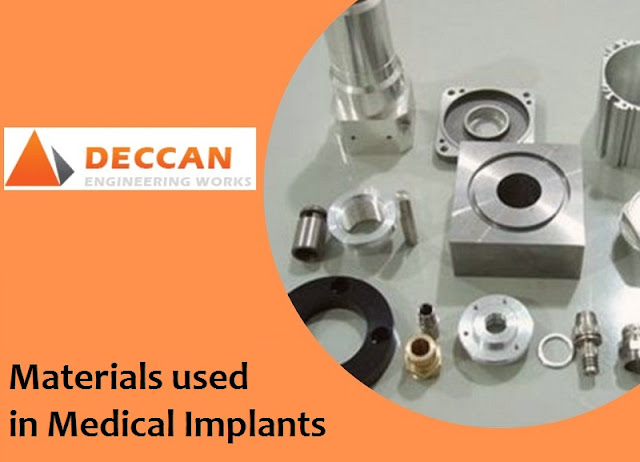Major Materials used in Medical Implants
Medical implants have been used by humans
for hundreds of years. Primary dental implants may be the foundation, but
current medical science is pushing the boundaries of implants every day.
What is an Implant?
Basically, Medical implants are devices or
tissues that are made up of plastic, ceramic, or metal. These medical implants
are manufactured for a particular application and placed inside or on the
surface of the body.
Many implants are prosthetics, aimed to
replace lost parts of the body like teeth, hips or knees. Other implants
provide medications, monitor body functions, or support organs and tissues.
Some implants are made through the skin, bones, or other tissues of the body.
Whereas, some are made from metals, plastics, ceramic, etc.
Implants can be kept permanently or they
can be removed when they are not needed. For example, stents or hip implants
are intended permanently. But for repair broken bones chemotherapy ports or
screws is not required to fit permanent so they can be removed.
Risks of Medical Implants
Implants give the human body a new lease
of life. But when implant replacement surgery is performed, the highest risk is
infection. A common risk is an infection, which can arise from skin contamination
during surgery. If the material causes harmful reactions, the human body may
also refuse the implant. Implants can fail from time to time and require repair
or replacement. Risks of medical implants
include placement or removal, infection, and surgery that occur during implant
failure. Some people get infected with the material used in implants.
Materials Used in Medical
implants:
1.
Austenitic Steel
– Austenitic steels are non-magnetic stainless steels that contain high
levels of chromium and nickel and low levels of carbon.
This steel is known for surgical practices as it is the most
corrosion-resistant when in direct contact with a biological fluid. It is
important that a medical implants is not susceptible to corrosion when placed
inside the human body to prevent the chances of infection occurring. This type
of stainless steel is particularly effective as a medical implant when in
cold-worked condition.
2.
Polyethylene - Almost
all knee replacement implants contain ultra-high-molecular-weight polyethylene
(UHMWPE). This is necessary to provide cushioning and movement. Polyethylene is
the most common plastic and it is often one of the materials used in medical
implants because it is a porous synthetic polymer that is biologically inert
and does not degrade in the body.
3.
Spine Screws, Rods, and
Artificial Discs – The spinal surgery implants include fusion
approached from the front, the back, or both. Spinal implants are pedicle
screws provide internal structural support while the bone fuses, and bone graft
can either be harvested from the patient or one of a number of synthetic bone
graft substitutes or extenders can be used.
4.
Metal Screws, Pins,
Plates, and Rods - These implants materials made of cobalt and
chrome. They are compatible with the body and hardly ever cause an allergic
reaction. Plates are like internal splints and they hold the broken pieces of
bone together. They are attached to the bone with screws. Screws can be used
alone to hold a fracture, as well as with plates, rods, or nails. Pins are used
in conjunction with other forms of internal fixation, but they can be used
alone to treat fractures of small bones.
5.
Coronary Stents
- Coronary stent is a tube-shaped device placed in
the coronary arteries that supply blood to the heart,
to keep the arteries open in the treatment of coronary heart
disease. Coronary stents medical implant can be used during a heart
attack to quickly open a blocked artery and reduce the amount of damage to your
heart.
Several Medical Implants
Manufacturers are performing their best in India.
They are able to manufacture medical implants using high-quality materials.
Medical Implants Suppliers in the market can supply top quality implants to
healthcare providers and patients.




Comments
Post a Comment